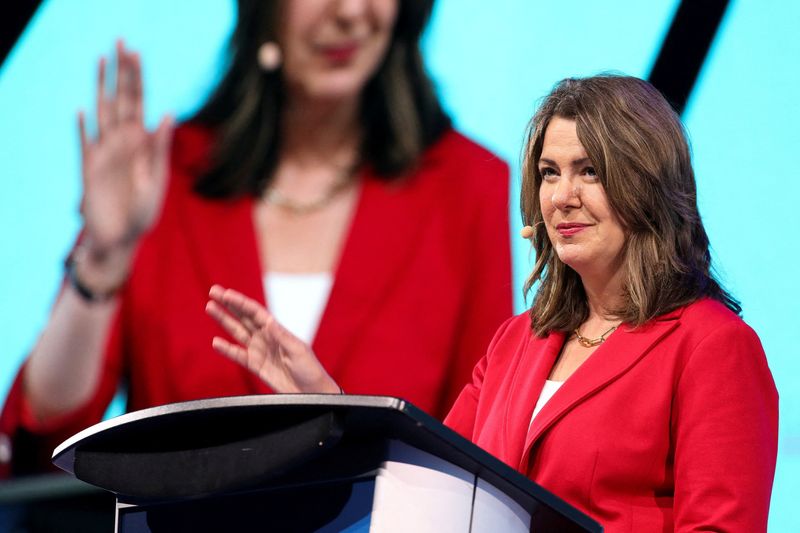By Nia Williams
(Reuters) -The Western Canadian province of Alberta will spend C$29 million ($20.46 million) to create a new sheriff-led patrol unit to police its 298-kilometer (185-mile) border with the U.S. state of Montana, the premier said on Thursday.
Alberta's plan follows a pledge from President-elect Donald Trump to impose a 25% tariff on imports from Canada and Mexico unless those countries crack down on illegal immigration and drug trafficking.
Premier Danielle Smith said Alberta has been working on increasing border security since July 2023, but Trump's tariff threat prompted the province to accelerate its plan.
Alberta is Canada's main oil-producing province and exports around 4 million barrels per day to the U.S., meaning it would be among the provinces hardest-hit by tariffs.
The new Interdiction Patrol Team will be part of the Alberta Sheriffs law enforcement agency and consist of 51 uniformed officers armed with carbine rifles, four drug-patrol dogs, 10 support staff, four narcotics analyzers to test for drugs and surveillance drones.
Alberta will also create a two-kilometer-deep border zone in which sheriffs will be able to arrest people found attempting to cross the border illegally or trafficking illegal drugs or weapons, without needing a warrant.
"Today's announcement represents a strong investment from Alberta's government that reflects the seriousness with which we're treating this current situation," said Alberta Minister of Public Safety Mike Ellis, speaking at a press conference alongside Smith.
Alberta has six official points of entry along its sparsely populated border with Montana.
Canada's federal leaders have vowed to beef up the border, but released few details. Public Safety Minister Dominic LeBlanc did not immediately respond to a request for comment.
It is not clear why Alberta needs the additional powers it is giving law enforcement, Shakir Rahim, lawyer and director of the Criminal Justice Program at the Canadian Civil Liberties Association, said in a statement.
"Existing legislation provides adequate enforcement powers to address border security and weapons or narcotics trafficking. ... CCLA will be closely monitoring the specific details of these new regulations to assess if they are overbroad."
In the 12 months ending in October U.S. authorities apprehended more than 23,000 people near the Canada-U.S. border - more than double the previous year but a tiny fraction of the 1.5 million people apprehended near the Mexico border in that time period.

Before it was pressured to tackle southbound migration, Canada was more concerned with people crossing northbound from the U.S. But even at the height of asylum-seekers crossing between ports of entry, there was never more than a handful crossing monthly into Alberta, according to Immigration, Refugees and Citizenship Canada data.
($1 = 1.4177 Canadian dollars)